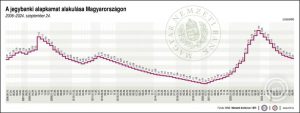
Average net earnings, excluding discounts, were HUF 423,400 (EUR 1,155).Continue reading

The Hungarian National Bank (MNB) has reduced the base rate by 25 basis points, bringing it down to 6.5%. Both ends of the interest rate corridor were lowered by the same margin, signaling cautious optimism toward economic stability.
Following a pause in rate cuts in August, the MNB’s latest decision reflects a more favorable external monetary policy environment and gradual disinflation. The council cited improvements in household consumption, financial market stability, and a slight enhancement in the country’s risk perception. This easing of monetary policy follows the earlier indication by MNB’s Deputy-president, Barnabás Virág that cautious rate cuts might resume.
The effects of the base rate cut are aimed at promoting economic growth, particularly through rising household consumption.
This easing could help stimulate domestic demand, expected to contribute to GDP (Gross Domestic Product) growth of 1.0-1.8% in 2024, increasing to 3.5-4.5% by 2026. However, the MNB emphasizes a patient, data-driven approach due to persistent risks in the global economy and investor sentiment.
Inflation remains volatile, but a disinflationary trend is expected to continue through 2025. The consumer price index is projected to rise slightly above 4% by year-end before moderating in the first quarter of 2025.

Changes in the base rate (2006-2024)- Picture: MTI
Additionally, the budget deficit and government debt-to-GDP ratios are expected to improve over the coming years, with the latter forecasted to decline from 73.2% in 2024 to 70.8% by 2026.
While the MNB’s base rate cut reflects cautious optimism, ongoing inflation volatility and external risks call for a patient and data-driven monetary policy to ensure long-term economic stability and fiscal discipline.
Via MTI; Featured Image: Pixabay